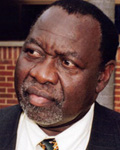|

The African Union (AU) this year will mark its 50th anniversary since the founding of the Organization of African Unity (OAU), a precursor to the current organization, on May 25, 1963. It was the first demonstration of the continent's desire for integration, displaying a collective spirit that brought together 32 governments to sign the OAU Charter in Addis Ababa, a membership that has since increased to 54.
Africa has made commendable strides in economic and political spheres in spite of a conspiracy of formidable problems. This has largely been possible thanks to integration at both regional and continental levels, which facilitated the upgrading of economies of scale by implementing cross-border development programs. Indeed, it was the recognition of these problems that inspired yester-year Pan-Africanists in founding the OAU.
Underscored prior to the formation of the OAU was that integration was a process and not an event.
The process that saw the founding of the OAU as an integrationist body had its inspiration beyond the continent. One such source emanated from the Bandung Conference in April 1955, with the gathering of 29 governments of African, Middle Eastern and Asian countries. Pan-Africanists at this conference brought to Africa lessons of integration already learned.
China and India are credited with having mooted the concept of integration in 1954. Significantly, the integration concept was captured in a resolution which sought "to build solidarity among recently independent nations."
Africa's foremost Pan-Africanist, Ghana's first President Kwame Nkrumah, best summed up the continent's future: "Here is a challenge which destiny has thrown out to the leaders of Africa. It is for us to grasp that golden opportunity to prove that the genius of African people can surmount the separatist tendencies in sovereign nationhood by coming together speedily, for the sake of Africa's greater glory and infinite well-being, into a Union of African States."
There are fundamental differences in the focus of the OAU and the AU, which received its new name on July 9, 2002, in Durban, South Africa. While the OAU's focus was on political integration, the AU seeks to address social and economic issues and also tackle challenges brought about by globalization.
The OAU's first challenge was to unify two groups. These were Casablanca and Monrovia groups. The former, regarded as Communist and led by Ghana's Nkrumah, advocated a federation of African states. The group included Algeria, Morocco, Egypt and Libya.
The Monrovia Group, led by Seder Senghor, Senegal's first President, wanted gradual unity achieved through economic cooperation. It did not support a political federation. The camp included Nigeria, Liberia and Ethiopia.
The AU has adopted a regional approach in its integration, instituting strategies that moved away from politics toward socioeconomic issues. At the policy level, member states have established the Pan-African Parliament, led at the implementation level by former South African Foreign Minister Nkosazana Dlamini-Zuma, who chairs the AU Commission.
This regional integration consists of several groupings. In West Africa, there is the Economic Community of West African States, with a conflict interventionist force, the Economic Community of West African States Monitoring Group. The Horn of Africa is integrated through the Intergovernmental Authority on Development.
The East African Community has expanded from the three countries of Kenya, Uganda and Tanzania to include Rwanda and Burundi. South Sudan has applied with Somalia next in line. In Central African countries, integration centers around Francophone. These include the Central African Republic and Gabon. Most of the North African countries congregate around the Maghreb Union as well as the predominantly Middle Eastern Arab League.
Further south, the Southern African Development Community member countries were enjoined in a customs union for the promotion of trade. Integration has been enhanced by membership in the Indian Ocean Rim Association for Regional Cooperation. Its primary purpose is to protect and preserve the utilization of the Indian Ocean resources sustainably.
The challenges that now face Africa's integration going forward can be grouped into natural and man-made. Natural challenges include drought, floods and diseases, like HIV/AIDS and malaria. Man-made challenges cross over political, social and economic lines. Political challenges include democratization, human rights, violation of the rule of law, conflicts and impunity. Social challenges are made up of brain drain, illiteracy, poverty and corruption, while economic challenges revolve around heavy debt burdens, marginalization, insufficient foreign investment, trade inequalities and a high population growth rate.
Despite these obstacles, African integration can help the continent secure a place and voice on the global stage, initiating African development in education, information and communications technology, culture, research and traditional knowledge. And in the words of Ghanaian Kingsley Amoako, former UN Under Secretary General, "Unity will not make us rich, but it can make it difficult for Africa and the African peoples to be disregarded and humiliated."
The author is director of the Institute for Public Policy and International Affairs at the United States International University, Nairobi, Kenya
Email us at: yanwei@bjreview.com | 